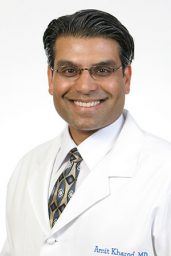Even with remarkable advances in breast cancer prevention, detection and treatment, the disease still affects one in eight American women. But due to earlier detection, there are more than two million survivors today and breast cancer diagnoses continue to decrease.
It is difficult to ignore reminders of the fight against this disease─NFL players wearing pink, messages posted on cereal boxes and milk cartons, televised fundraising telethons and local special events. But just acknowledging breast cancer prevention won’t protect you. The most important step is to take action.
Mammogram. This quick and painless test is one of the most obvious ways to protect your breast health. Talk with your doctor about how frequently you need this exam, based upon your age, medical history and risk factors.
Food. To help ward off cancer and other diseases, make a diet rich in colorful vegetables, fruits and legumes part of your daily lifestyle. Minimize consumption of red meat, sodium and processed carbohydrates.
Weight. The short and long-term benefits of maintaining a healthy weight far outweigh the temporary pleasures of desserts and junk food.
Family History. About 15 percent of breast cancer cases are associated with family history. If you have a close relative (parent, sibling, aunt, uncle) who has cancer, your risk is increased.
Self Check. Check your breasts regularly. If you discover a lump, fluid coming from the nipple, breast pain or observe other visible changes, see your doctor promptly.
Alcohol. Keep your alcohol consumption in check but if you do drink, have a glass of red wine which as been proven to reduce estrogen levels and cancer risk.
Exercise. Regular physical activity (just 30 minutes most days of the week) has been shown to help prevent cancer and other diseases.
When breast cancer is diagnosed, an important concern is that it can spread, or metastasize, to other areas of the body through lymph ducts (nodes) and blood vessels under the arm. Some of these lymph nodes may be surgically extracted using a minimally invasive procedure called sentinel lymph node biopsy, which removes only the sentinel lymph node and other suspicious nodes. Patients who undergo this procedure can typically resume regular activities within a few days.
First and foremost, adopt these proven methods described here to help prevent cancer in your lifetime. Should you ever be faced with a breast cancer diagnosis, keep in mind today’s cancer treatment is focused on preserving as much of the healthy breast and surrounding tissue as possible. This promotes significantly less physical and emotional trauma for the patient, quicker recovery, and less pain and scarring. Talk with a board certified breast surgeon to determine which surgical alternatives will offer you the most positive outcome.
The Statesir Cancer Center at CentraState Medical Center offers the latest diagnostic, treatment and rehabilitative services managed by a team of specially-trained cancer physicians and clinical specialists. For more information, call (855) 411-CANCER (226237).
In addition, the Star and Barry Tobias Women’s Health Center at CentraState, which was the first in the area to be designated a Breast Imaging Center of Excellence by the American College of Radiology, offers technical expertise, customized health education and counseling services from an all-female staff, and provides a breast health specialist who is a public educator on breast diseases and cancer detection. In addition to mammography, the center also offers stereotactic needle biopsy, breast needle localization, and bone densitometry. For more information, call (732) 294-2626. To schedule an appointment, call (732) 294-2778.
 Amit Kharod, MD is a board-certified general surgeon on staff at CentraState Medical Center in Freehold. He can be reached at Advanced Surgical Health Associates in Freehold by calling (732) 308-4202.
Amit Kharod, MD is a board-certified general surgeon on staff at CentraState Medical Center in Freehold. He can be reached at Advanced Surgical Health Associates in Freehold by calling (732) 308-4202.





